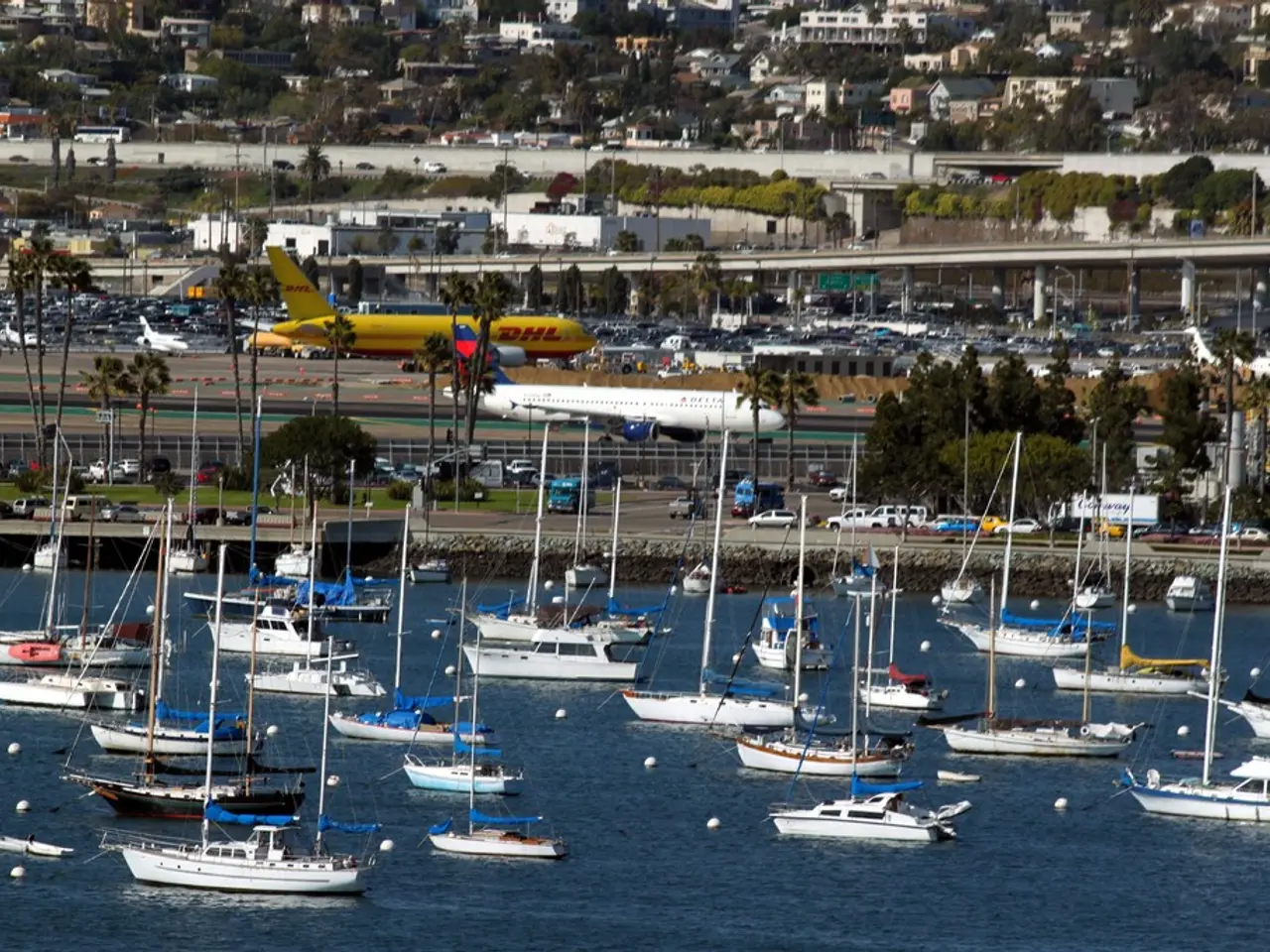financialbacking for Britain's seafaring sector
The maritime industry is at a critical juncture, facing significant challenges such as decarbonisation and adapting to new technologies like artificial intelligence and autonomous shipping. To address these issues, alternative sources of finance are being considered to cover the estimated cost of decarbonising the industry, which ranges between $1.5 and $1.9 trillion.
The upcoming event, hosted by the Department for Transport, Maritime London, and their website, promises to delve into these challenges and explore solutions. Leading figures within the maritime community will participate, and attendees can look forward to keynote speeches and panel discussions on how the UK is addressing these challenges and supporting the industry.
The seminar commences at 16:00 and registration begins at 15:30. Registration is encouraged early to secure a spot, as spaces are limited. The event will feature a networking reception following the seminar. It's important to note that the organizers may limit the number of attendees per organization if the event is oversubscribed.
The event's agenda, detailing the discussions and presentations, can be viewed on their website. The goal is for the maritime industry to achieve net zero emissions by 2050, and the event aims to discuss how the UK has positioned itself to support the industry into the future.
Key Challenges in Decarbonising the Maritime Industry
The key challenges in decarbonising the maritime industry include the heavy reliance on carbon-intensive fossil fuels, limited availability and supply of carbon-neutral fuels, technological maturity of low-emission alternatives, regulatory complexity, and infrastructure gaps especially in ports. The industry must also address retrofitting older vessels, overcoming onboard storage constraints, and coordinating among numerous stakeholders in shipping, fuel production, and regulation.
Solutions for Decarbonisation
The solutions involve a combination of adopting alternative fuels, energy efficiency upgrades, retrofit engineering, deploying digital innovations, using shore power in ports, exploring onboard carbon capture and storage systems, implementing smart grids and interoperable data platforms, and establishing strong regulatory frameworks.
Some of the alternative fuels under consideration include LNG, bio-LNG, ammonia, methanol, green hydrogen, and synthetic fuels. Energy efficiency upgrades, such as hull and propeller modifications, wind-assist technologies, and weight reduction, can lower fuel consumption. Retrofit engineering and modular solutions enable older ships to operate on cleaner fuels or incorporate emissions-reducing technology.
Digital innovations like AI-driven performance monitoring and smart routing can optimize fuel use and emissions reductions. Shore power in ports allows ships to switch off engines and plug into renewable electricity. Onboard carbon capture and storage systems can capture emitted CO2, although challenges remain in storage capacity and regulation.
Smart grids and interoperable data platforms in ports can coordinate energy use, integrate renewables, and reduce waste. Strong regulatory frameworks, such as IMO’s 2050 net-zero target, EU’s Alternative Fuels Infrastructure Regulation (AFIR), and the EU Emissions Trading Scheme (ETS), drive compliance and innovation.
The UK's Role in Maritime Innovation and Sustainability
The UK is globally recognized as a maritime leader investing in advanced port infrastructures, supporting green fuel development, and fostering collaboration among ship owners, technology providers, and regulators to pioneer decarbonization strategies. The UK's ports are moving towards becoming smart energy hubs integrating renewables and shore power, and the country actively participates in international regulatory bodies shaping maritime sustainability.
UK-based firms and research institutions are prominent in developing retrofit technologies, clean fuels (e.g., hydrogen), and digital solutions supporting operational efficiency. Erika Gardiner can be contacted for any questions regarding the event.
[1] Maritime Executive. (2022). The UK’s Role in Maritime Innovation and Sustainability. Retrieved from https://www.maritime-executive.com/article/the-uks-role-in-maritime-innovation-and-sustainability [2] International Maritime Organization. (2021). Decarbonisation of the Maritime Industry. Retrieved from https://www.imo.org/en/OurWork/Environment/AirPollution/GHG/Documents/Decarbonisation-of-the-maritime-industry.pdf [3] European Commission. (2020). Alternative Fuels Infrastructure Regulation (AFIR). Retrieved from https://ec.europa.eu/transport/modes/ship/alternative-fuels_en [4] European Parliament. (2018). EU Emissions Trading Scheme (ETS). Retrieved from https://www.europarl.europa.eu/news/en/headlines/economy/20180104STO64186/the-eu-emissions-trading-system-ets-explained [5] Nautilus International. (2021). Decarbonising the Maritime Industry: Challenges and Solutions. Retrieved from https://www.nautilusint.org/news/reports/decarbonising-the-maritime-industry-challenges-and-solutions.html
- The upcoming event, in light of the UK's investment in maritime innovation and sustainability, will feature discussions on how the UK is utilizing cutting-edge technology, such as AI and autonomous shipping, to address environmental issues in the maritime industry while exploring alternative financing options for decarbonization projects.
- Given the UK's role in fostering collaboration between ship owners, technology providers, and regulators, panel discussions at the event will undoubtedly delve into the UK's progress in developing alternative fuels like green hydrogen and LNG, as well as the adoption of digital solutions like AI-driven performance monitoring, to ensure the maritime industry aligns with environmental-science standards and achieves net-zero emissions by 2050.




